10 best Magento alternatives for e-commerce in 2025

Kenneth Pangan
Last edited August 26, 2025

Magento, now known as Adobe Commerce, has been a major player in the e-commerce game for a long time. It’s packed with features and is super flexible, which is great if you’re a massive business with really specific needs. But let's be real, that kind of power doesn't come cheap. The steep learning curve, high development costs, and the constant need for tech experts have a lot of businesses searching for [Magento alternatives.
If you feel like you're pouring money into a "Magento pit" or just want a platform that doesn't require a developer on speed dial, you're in the right place. This guide will walk you through the 10 best hosted and open-source alternatives so you can find a platform that actually fits your budget, team, and growth plans for 2025.
What are e-commerce platforms anyway?
At its core, an e-commerce platform is the software that lets you build and manage an online store. Think of it as the foundation of your entire digital operation. It handles everything from your website's look and product pages to marketing, sales, and order management. It's the engine that keeps your online business running.
Why are people looking for Magento alternatives?
Magento is a big name, but it comes with some common headaches that push businesses to look elsewhere. It’s not just about finding a different tool; it’s about finding a better way to work.
- The hidden costs add up: Magento Open Source might be free to download, but the real costs catch up to you fast. You're paying for expensive hosting, custom development work, security patches, and paid extensions. Before you know it, you've spent a small fortune just keeping the lights on.
- It's technically demanding: Let's be blunt: Magento isn't for beginners. It has a tough learning curve and you'll need specialized developers for almost everything, from simple design changes to major updates. If you don't have a dedicated tech team, you’ll be hiring outside help constantly.
- Things move slowly: Relying on developers for every little thing creates a huge bottleneck. Your marketing and sales teams can't launch a new campaign or update a product description without filing a ticket and waiting. This really slows down your ability to react to what's happening in your market.
- Maintenance is a drag: Keeping your store secure, fast, and PCI compliant on Magento is practically a full-time job. Instead of focusing on growing your business, your team gets bogged down in technical chores, which drains a ton of time and resources.
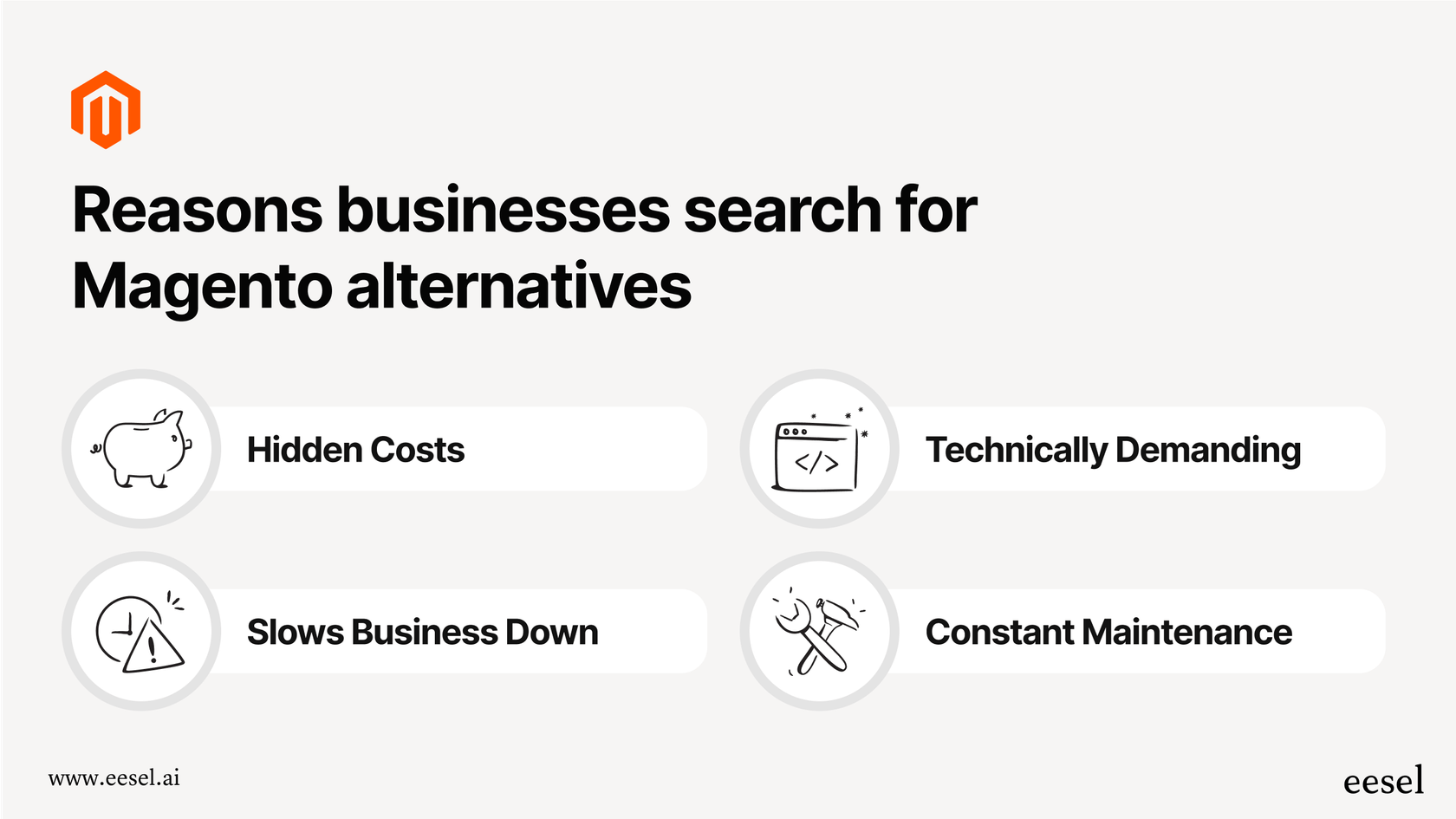
How we picked the best Magento alternatives for this list
We didn't just pull these names out of a hat. To make this list genuinely useful, we measured each platform against a few key things that actually matter to business owners.
- Ease of use: How simple is it for someone without a technical background to manage the store day-to-day?
- Scalability: Can it grow with your business? We wanted platforms that could support you from a small startup to a much larger operation.
- Pricing: What's the real price tag? We looked beyond the monthly fee to consider transaction fees, app costs, and other hidden charges.
- Integrations: How well does it connect with the other tools you use every day, like your help desk or email marketing software?
- Support and automation: What kind of help is available when something goes wrong? And how easily can you automate tasks like customer service to free up your team?
Magento alternatives comparison at a glance
Here’s a quick overview of how our top picks compare.
| Platform | Type | Best For | Starting Price (Monthly) | Key Feature |
|---|---|---|---|---|
| Shopify | SaaS | Businesses of all sizes prioritizing ease of use | $39 | All-in-one platform with a massive app store |
| BigCommerce | SaaS | Growing B2B & B2C businesses | $29 | No transaction fees, strong native features |
| Salesforce Commerce | SaaS | Large enterprises with complex needs | Custom | AI-powered personalization |
| Wix | SaaS | Small businesses & startups | $29 | Intuitive drag-and-drop website builder |
| Squarespace | SaaS | Creatives & brands focused on design | $23 | Award-winning, mobile-responsive templates |
| Shift4Shop | SaaS | US-based businesses looking for value | Free (for US merchants) | Over 200 built-in features |
| WooCommerce | Open-Source | Businesses already using WordPress | Free (plugin) | Unmatched flexibility within WordPress |
| Shopware | Open-Source | B2B & B2C businesses, especially in Europe | Free (Community Edition) | API-first, highly scalable architecture |
| PrestaShop | Open-Source | Small to medium businesses needing customization | Free | Comprehensive out-of-the-box features |
| OpenCart | Open-Source | Small businesses with developer support | Free | Lightweight and user-friendly admin panel |
The 10 best Magento alternatives for your e-commerce store
Ready to get into the details? Let’s break down the best alternatives to Magento, separated into easy-to-use hosted platforms and more flexible open-source options.
Hosted (SaaS) Magento alternatives
These platforms take care of all the technical headaches for you, so you can just focus on selling.
1. Shopify
You've probably heard of Shopify, and for good reason. It's the go-to all-in-one e-commerce platform because it blends simplicity, powerful features, and a huge app store that lets you add pretty much any function you can think of. Shopify handles the boring stuff,hosting, security, updates,so you can focus on your brand.
- Pros: Super user-friendly, 24/7 customer support, scales from startup to enterprise without a hitch, and has a giant app ecosystem.
- Cons: You'll face transaction fees if you don't use Shopify Payments, and some advanced customizations might require an app or messing with code.
- Pricing: Basic: $39/mo, Shopify: $105/mo, Advanced: $384/mo.
- Best for: Any business that just wants a reliable, all-in-one solution that works right out of the box.
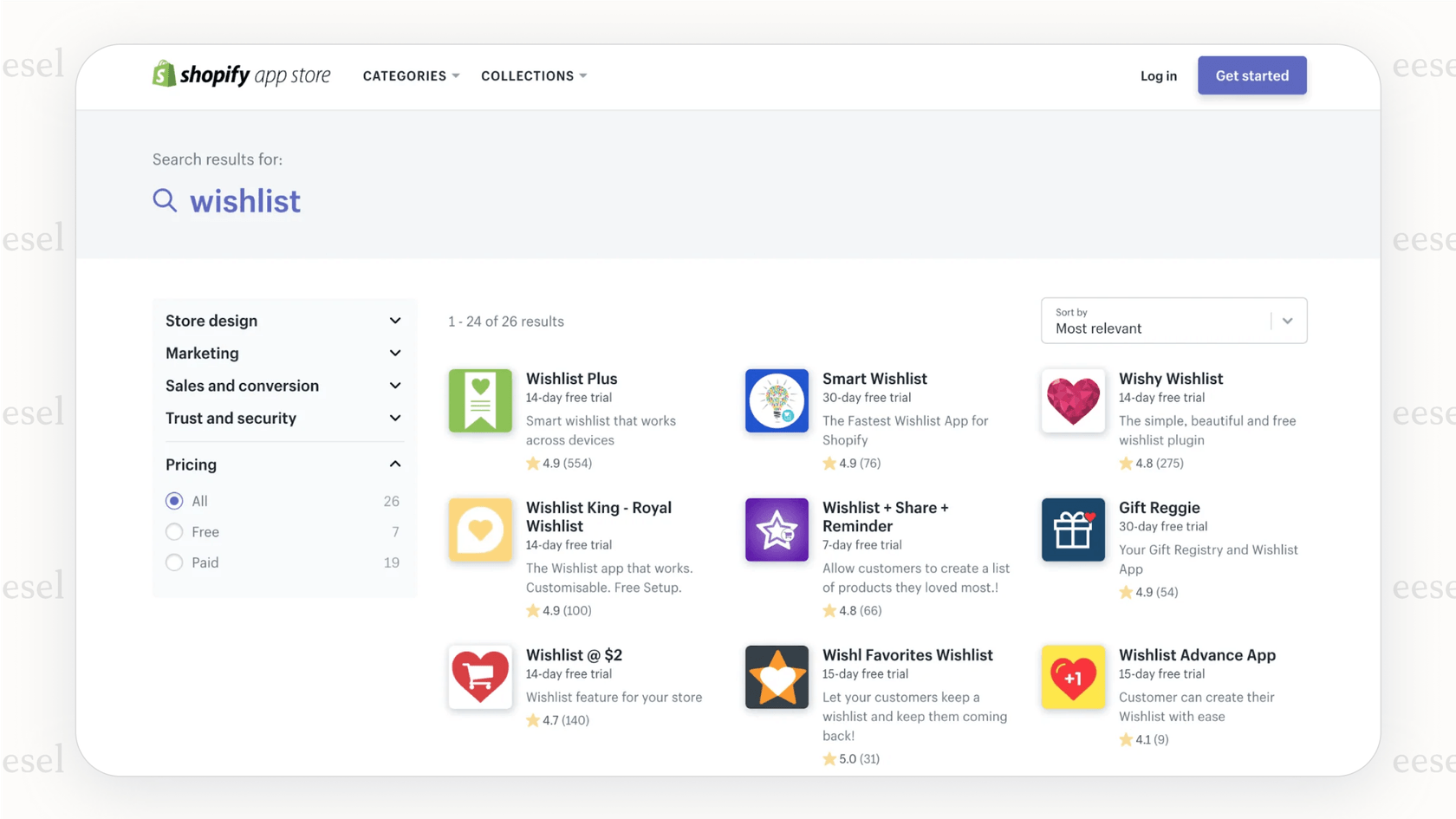
2. BigCommerce
BigCommerce is a heavy-hitting SaaS platform designed for ambitious, fast-growing companies. Its main selling points are zero transaction fees and a boatload of built-in features for both B2C and B2B, which means you won't have to lean so heavily on third-party apps.
- Pros: No transaction fees on any plan, solid built-in SEO tools, powerful native features, and it can handle serious growth.
- Cons: It's a bit more complex than Shopify, and the cheaper plans have annual sales limits that might push you to upgrade sooner than you'd like.
- Pricing: Standard: $29/mo, Plus: $79/mo, Pro: $299/mo.
- Best for: Brands that are growing quickly and established businesses that want advanced features included from the start.
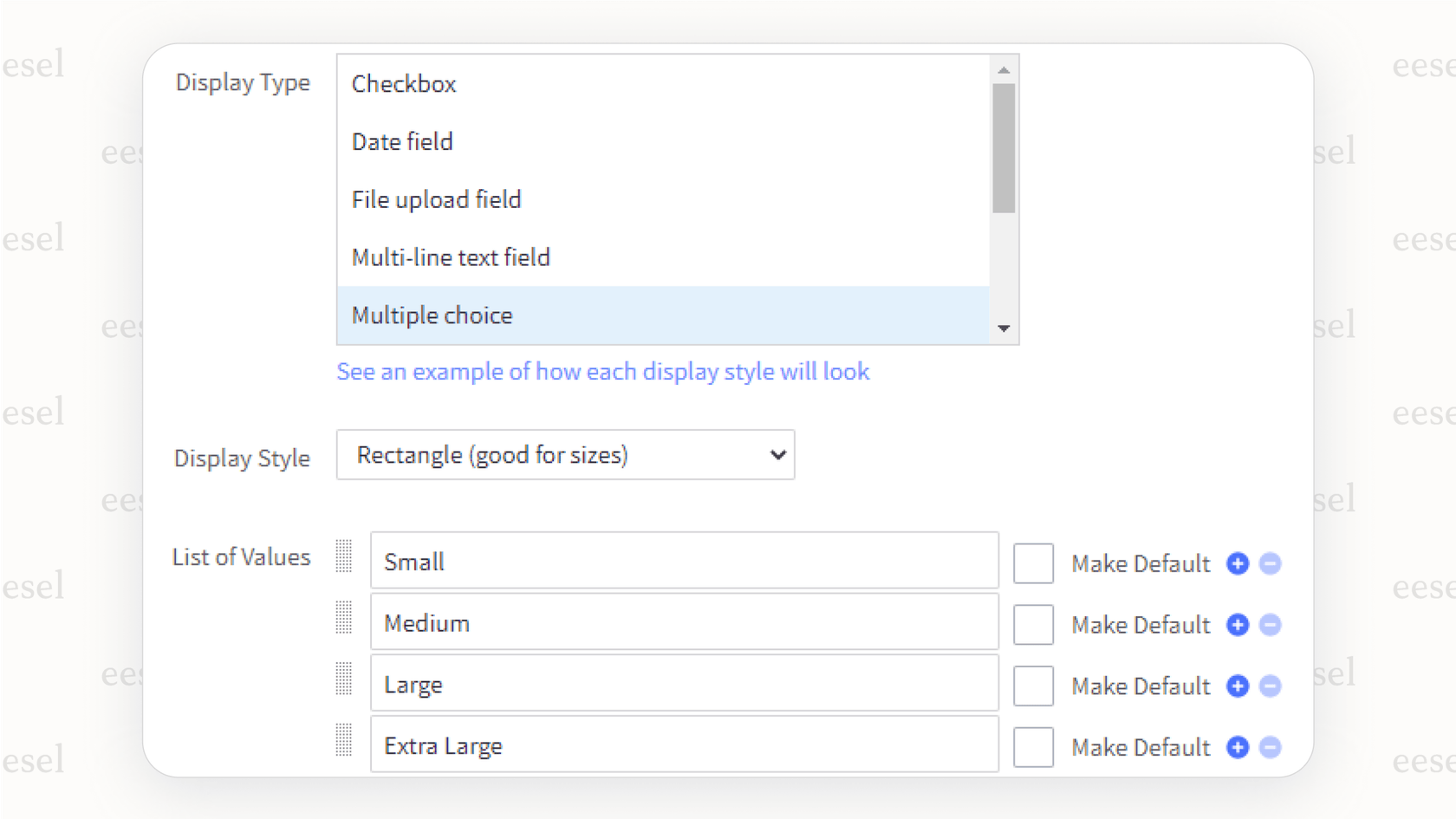
3. Salesforce Commerce Cloud
Formerly Demandware, Salesforce Commerce Cloud is the enterprise-level solution for the big leagues. It’s built for large retailers who need sophisticated, AI-driven personalization and want to create a seamless experience across every single sales channel.
- Pros: Built to scale for global operations, has powerful AI tools, and does a great job of connecting online and in-person shopping.
- Cons: It’s very expensive, can be a beast to implement, and you'll need a technically skilled team to manage it.
- Pricing: Custom pricing based on your Gross Merchandise Value (GMV).
- Best for: Large, global companies with complex needs and the budget to support them.
4. Wix
Wix began as a simple website builder but has grown into a respectable e-commerce platform, particularly for smaller businesses. It’s known for its incredibly intuitive drag-and-drop editor and a huge library of professional templates that make it easy to get a great-looking store online fast.
- Pros: Extremely user-friendly, gives you a lot of design freedom, and has affordable plans to get you started.
- Cons: It's not the best option for very large stores and lacks some of the high-end e-commerce features of its competitors.
- Pricing: Core: $29/mo, Business: $36/mo, Business Elite: $159/mo.
- Best for: Small businesses, entrepreneurs, and startups who want a beautiful, functional store without writing a single line of code.

5. Squarespace
Squarespace is all about looks. It’s famous for its stunning design templates and a clean, integrated e-commerce system that’s perfect for brands where visuals are everything. If your brand's identity is tied to its aesthetic, Squarespace should be on your list.
- Pros: Gorgeous, mobile-friendly templates, a very easy-to-use interface, and solid built-in marketing tools.
- Cons: You don't have as many payment gateway options, and its app store isn't as big as what Shopify or BigCommerce offer.
- Pricing: Business: $23/mo, Basic Commerce: $27/mo, Advanced Commerce: $49/mo (when billed annually).
- Best for: Artists, designers, and creative brands where a polished presentation is non-negotiable.
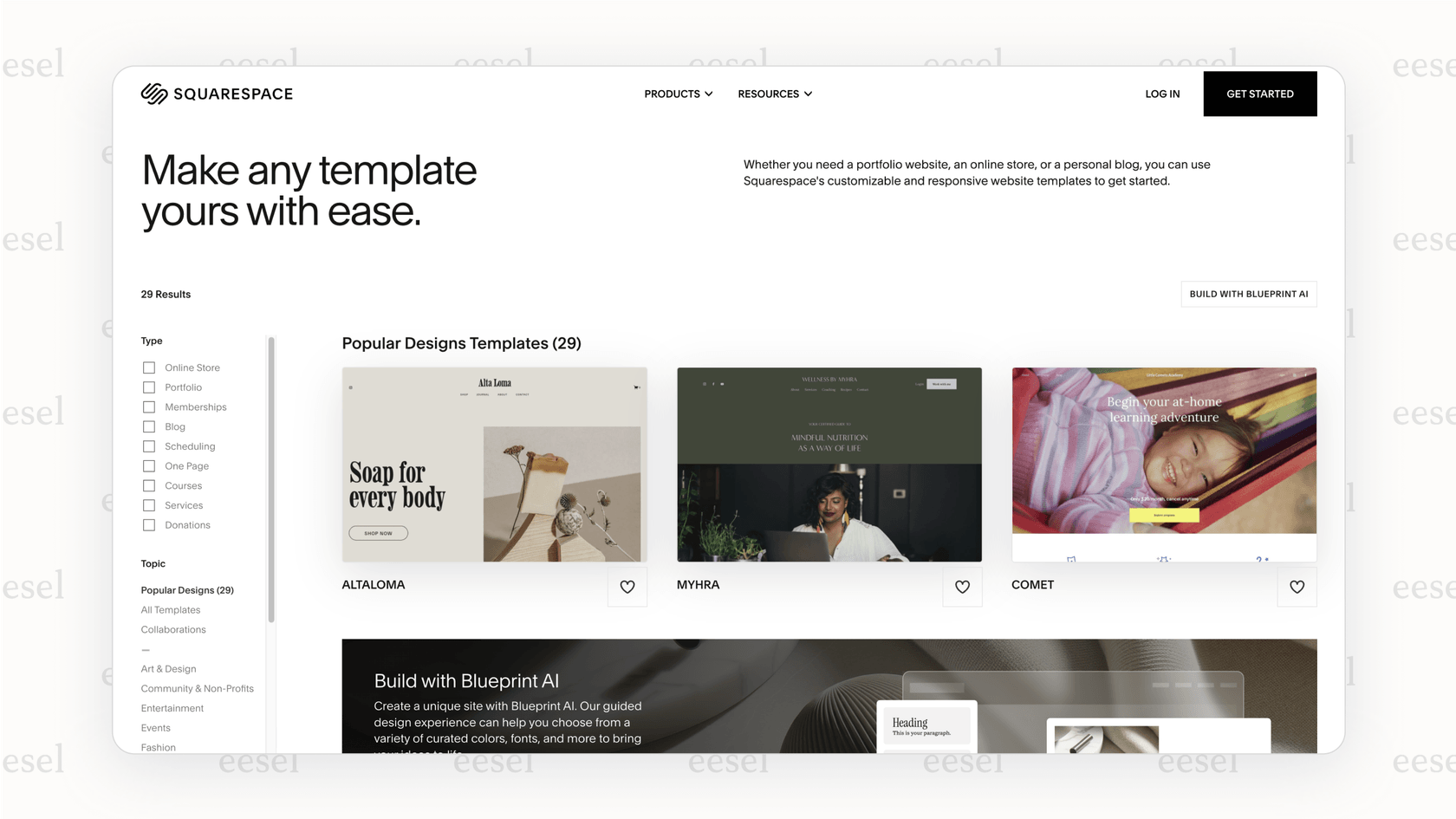
6. Shift4Shop
Shift4Shop (you might remember it as 3dcart) is a feature-packed platform with a very unique offer: a totally free, enterprise-level plan for US merchants who use its payment processor, Shift4. It comes loaded with hundreds of built-in features, from SEO tools to promotions.
- Pros: An incredibly powerful free plan (for US merchants), strong built-in SEO tools, and no transaction fees.
- Cons: The admin dashboard feels a little dated, and the free plan locks you into using their payment processor.
- Pricing: The End-to-End plan is free for US merchants. Other plans start at $29/mo.
- Best for: US-based businesses looking for a robust, feature-rich platform at an unbeatable price.
Open-source Magento alternatives
If you want total control and don't mind getting your hands dirty, these open-source platforms give you the ultimate flexibility.
7. WooCommerce
WooCommerce isn't a standalone platform. It's a free, open-source plugin that transforms any WordPress site into a full-blown e-commerce store. This gives you incredible freedom to customize, especially if you're already at home in the WordPress world.
- Pros: Endlessly customizable, a massive library of extensions and themes, fits perfectly with WordPress, and has no platform fees.
- Cons: You're on the hook for your own hosting, security, and maintenance. Performance can also be hit-or-miss depending on your hosting and how many plugins you're using.
- Pricing: The plugin is free. You'll pay for hosting, themes, and any extra extensions.
- Best for: Businesses already on WordPress or anyone who wants complete control and loves the idea of mixing content and commerce.
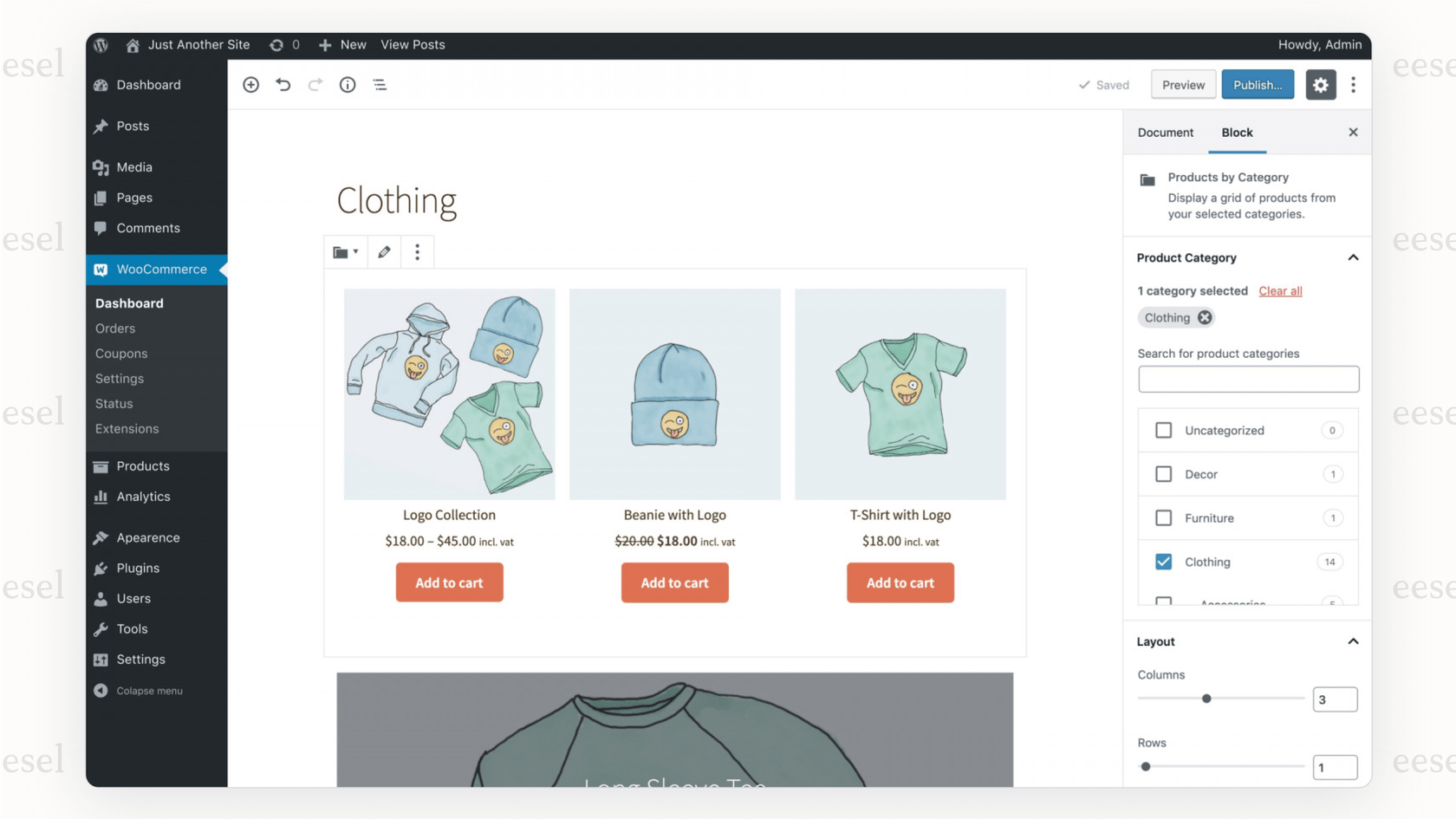
8. Shopware
Shopware is a German-engineered open-source platform that's getting a lot of attention for its modern, API-first design. It's extremely flexible and can scale up nicely, making it a great pick for growing B2B and B2C businesses that want a future-proof setup.
- Pros: Very scalable and flexible, strong built-in B2B features, and a modern architecture that developers appreciate.
- Cons: The community and support resources are smaller outside of Europe, and setting it up can be tricky.
- Pricing: The Community Edition is free. Paid plans with commercial support start around €600 per month.
- Best for: Mid-sized to enterprise businesses, especially in Europe, that need a flexible platform for complex scenarios.
9. PrestaShop
PrestaShop is another well-liked open-source option that finds a nice middle ground between having lots of features out of the box and being user-friendly. It’s a solid pick for merchants who want deep customization but don't want the enterprise-level cost and complexity of Magento.
- Pros: Comes with a ton of included features, has strong international selling tools, and an active community for support.
- Cons: You'll have to pay for some key modules and professional themes, and scaling a PrestaShop store usually requires some technical help.
- Pricing: The software is free. You pay for hosting, themes, and modules.
- Best for: Small to medium-sized businesses that want fine-grained control and lots of customization options.
10. OpenCart
OpenCart is a lightweight and pretty straightforward open-source platform. People like it for its easy-to-use admin panel and the ability to manage multiple storefronts from one backend,a powerful feature for a free tool.
- Pros: Simple to learn and set up, runs fast because it's so light, and supports multi-store management.
- Cons: You'll need to add extensions for more advanced features, and its built-in SEO tools are pretty basic.
- Pricing: Free. You'll have to pay for hosting, themes, and any extensions you want.
- Best for: Small businesses and startups with some developer help that need a simple, fast foundation to build on.
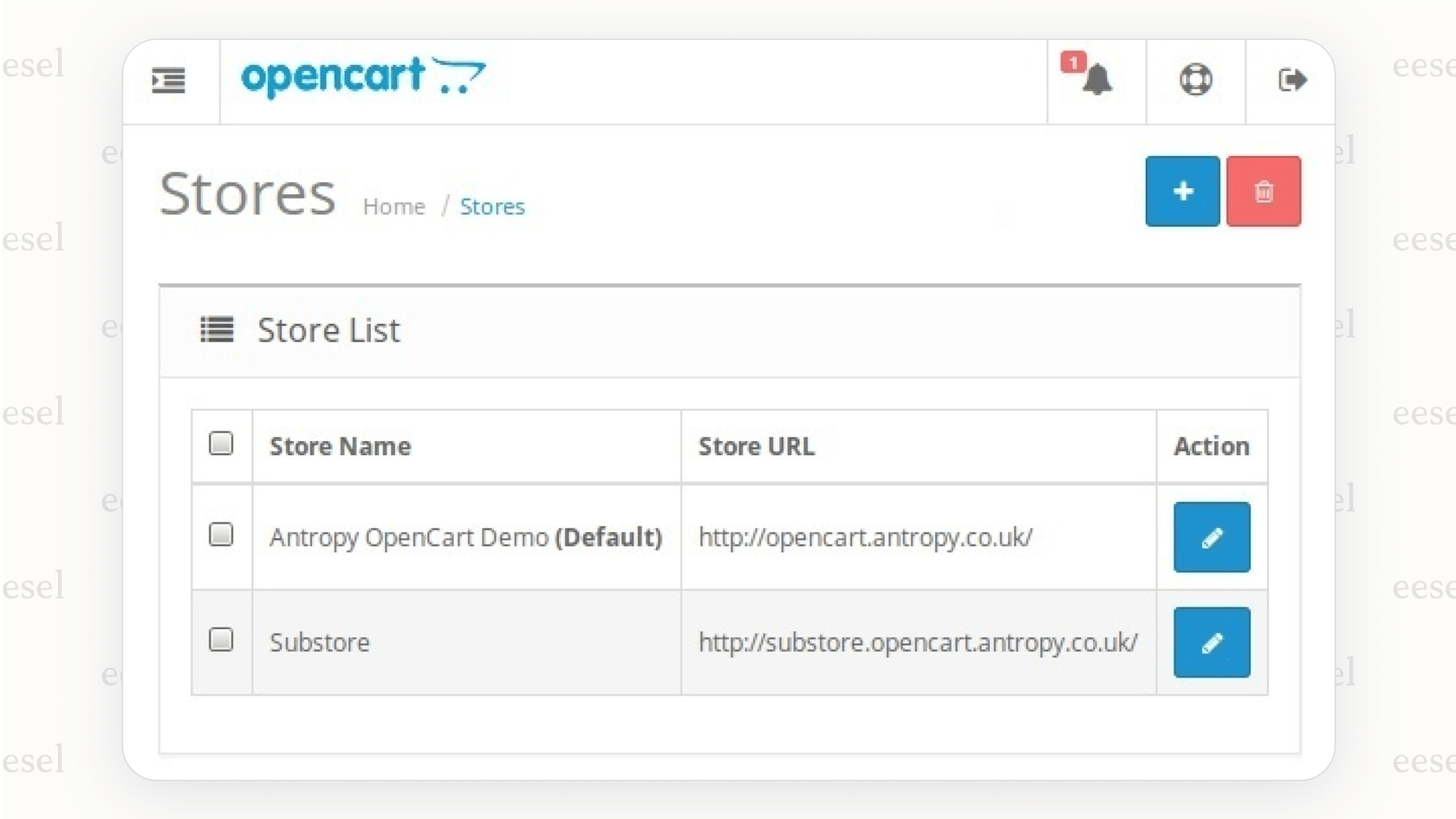
Give your new platform a boost with AI-powered customer support
Switching your e-commerce platform is a huge move, but it's only one piece of the puzzle. As you get more sales, you'll get more customer questions. Juggling support tickets about orders, returns, and products can quickly overwhelm your team and chip away at the great customer experience you're trying to build.
This is where a tool like eesel AI can make a real difference. Instead of ditching your help desk and starting from scratch, eesel AI works on top of the tools you already use, like Zendesk, Gorgias, or Freshdesk. There's no painful migration,just a simple integration that adds powerful AI to your existing workflow.
Here’s how eesel AI can help your new store:
- AI Chatbot: Add an AI chatbot to your storefront that's on duty 24/7. It learns from your product catalog on platforms like Shopify or WooCommerce, plus your help articles, to give shoppers instant, correct answers about your products, shipping, and policies.
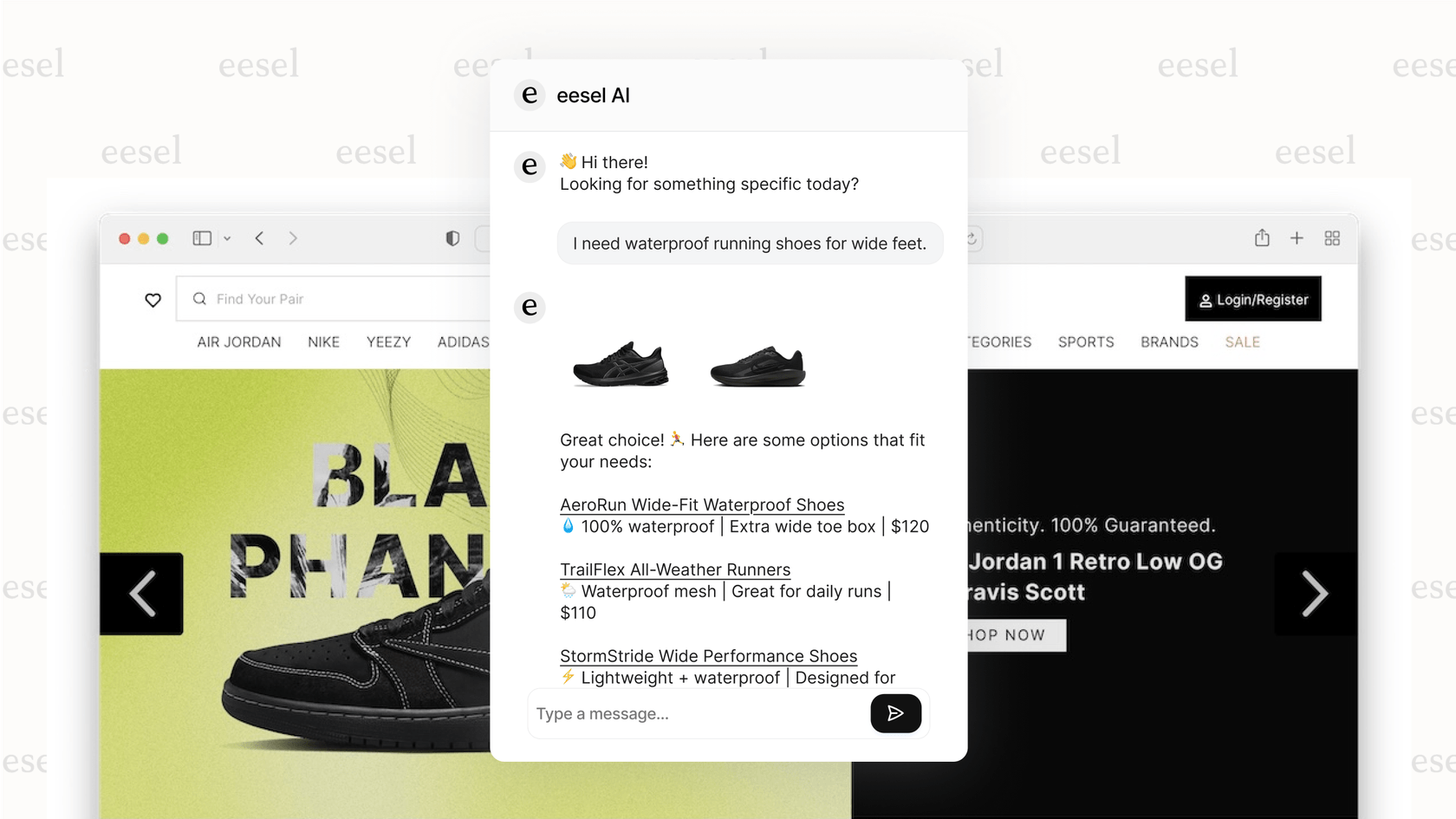
- AI Agent & AI Triage: Let an AI agent take care of the flood of repetitive support tickets. It can automatically resolve up to 70% of common questions by looking up order statuses, processing returns, and answering FAQs. This lets your human agents focus on the more complicated issues that actually need a person.
How eesel AI’s Triage handle support tickets. Best of all, you can try it out in a sandbox environment first. eesel AI can simulate how it would perform on your past support tickets, so you can see exactly how much time and money you’d save before you even turn it on.
How to choose the right Magento alternatives for your business
Feeling a little swamped by the options? Here are a few practical tips to help you make a good decision.
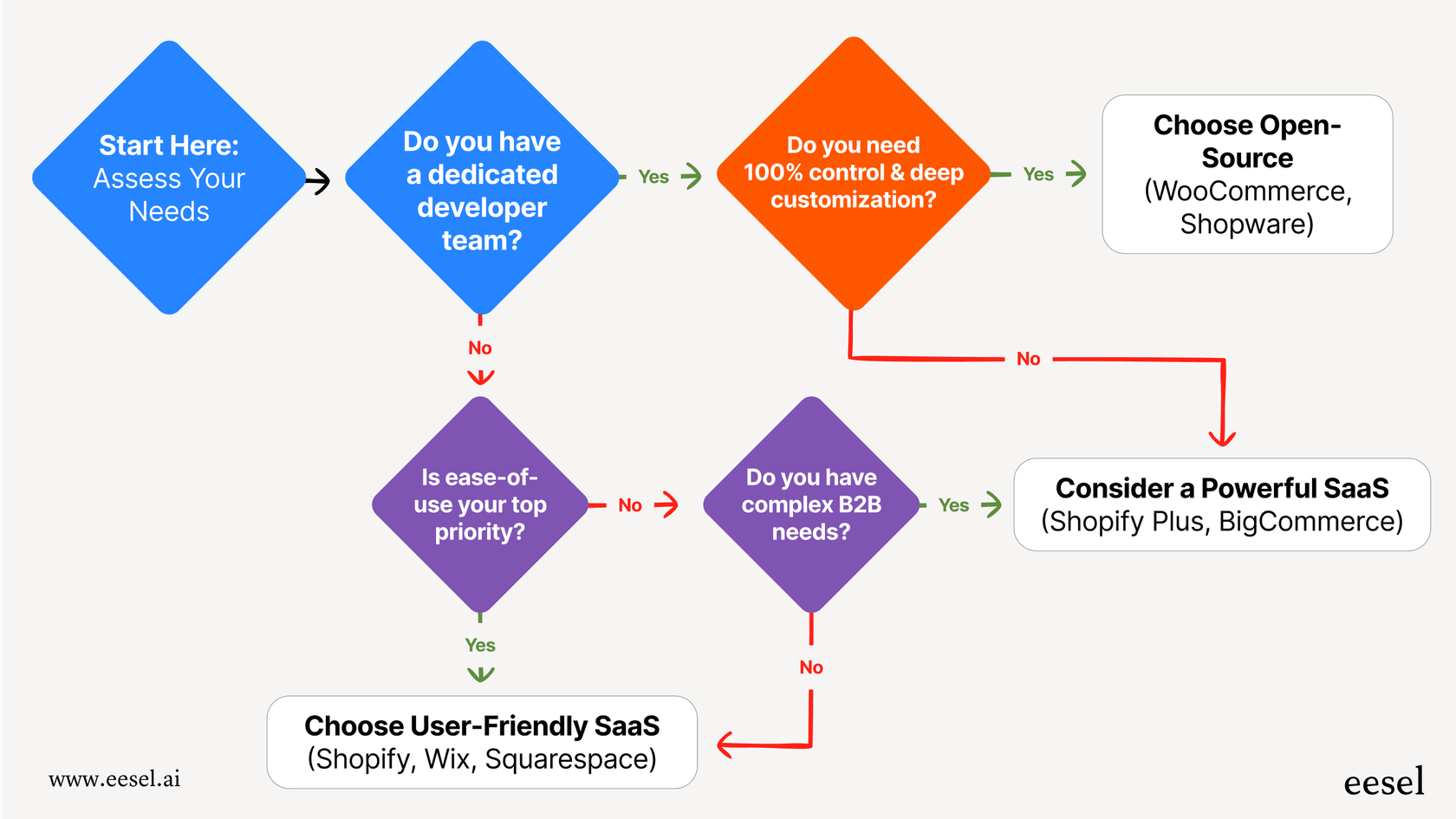
- Be honest about your tech skills: Do you have a developer on your team, or do you need a no-code tool that anyone can use? This is probably the biggest deciding factor.
- Figure out the true cost: Don’t just look at the monthly price. Add up the potential costs of hosting, transaction fees, essential apps, and developer time to see the whole picture.
- List your "must-have" features: Make a list of things you absolutely cannot live without. Do you need advanced B2B tools, multi-store management, or specific marketing integrations? Let that list guide you.
- Think about the future: Where do you see your business in two years? Pick a platform that can grow with your sales and product line so you aren't stuck switching platforms all over again.
- Focus on the customer experience: At the end of the day, your platform needs to give your customers a fast, secure, and easy shopping experience on both desktop and mobile.
Find the right Magento alternatives, then perfect your support
Choosing the right Magento alternative is about finding the right balance for your business needs, budget, and technical skills. Whether you go for a user-friendly SaaS platform like Shopify or a flexible open-source solution like WooCommerce, the goal is to find a foundation that helps you grow instead of holding you back.
Once you’re settled in your new e-commerce home, the next move is making sure your customer support can keep up. eesel AI integrates with any of these platforms and your help desk to automate repetitive support, lower costs, and keep your customers happy.
Ready to see what AI can do for your support team? Start your free eesel AI trial today.
Frequently asked questions
For hosted platforms, Wix and Squarespace offer very affordable entry points, while Shift4Shop's free plan for US merchants is an incredible value. For open-source, WooCommerce and OpenCart are free to download, but remember to budget for hosting and potential development costs.
Shopify is widely considered the gold standard for ease of use, making it perfect for non-technical teams. Wix and Squarespace are also excellent choices, known for their intuitive drag-and-drop editors that let you build and manage a store without writing any code.
For hosted solutions, Shopify Plus and BigCommerce Enterprise are designed to handle high-volume sales and complex operations. On the open-source side, Shopware has a modern, scalable architecture that is well-suited for growing enterprise businesses that require flexibility.
Choose an open-source platform if you need complete creative control, want to deeply customize functionality, and have access to development resources. A hosted platform is better if you prioritize speed, simplicity, and want to avoid managing technical details like hosting and security yourself.
Yes, several platforms excel here. BigCommerce has strong native B2B functionality built-in, while Shopware is also highly regarded for its flexible B2B features. Shopify Plus also offers robust B2B capabilities for its enterprise-level clients.
It's a very common process, and most platforms aim to make it manageable. Major platforms like Shopify and BigCommerce offer dedicated migration tools or partner with third-party services to help move your products, customers, and order history as smoothly as possible.
Share this post

Article by
Kenneth Pangan
Writer and marketer for over ten years, Kenneth Pangan splits his time between history, politics, and art with plenty of interruptions from his dogs demanding attention.





